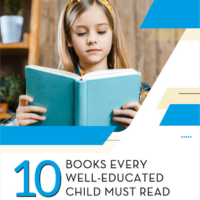Timeless Tips for Encouraging Your Children to Read
/My son and I were on a train through the south of Germany when I looked to my left and saw a child reading. And then I saw another child reading. And then another child.
I said to my son, "Look, there's actually children reading on this train; how exciting!"
"What a sorry day it is when you get excited about a child reading," he replied.
"I know, tell me about it."
But non-reading kids are the reality today. Kids are staring at screens instead of absorbing what's going on around them, learning from great books, engaging in life, or socializing with real people.
“They are living virtual lives,” as my son put it.
My eyes kept glancing over at these children, and then I noticed their parents were speaking English. At some point, I couldn't hold back any longer, so I went up to the parents and told them it was a joy to see that they were raising kids who actually liked to read.
And they pointed down the train to another family of kids who were reading. I can't tell you what a delight it was to see kids with books in their hands and no screens.
One Family's Success
We talked about the loss of reading in our culture, and they expressed their contentment in having kids who enjoyed a good book. I could see they were really pleased with their success in raising kids who read.
The youngest child, a boy, was playing hangman with his dad. His father said to me, "He is supposed to be reading too!"
These kids were all screen-free. No whining. No complaining. The children were happily occupied on a long train ride through Germany with their noses in books (minus one).
Took me back to my own kids and how they used to do the same. Or they’d gaze out the window and take in the sights or we’d chat about something they found interesting—as I’m sure the children on the train did too.
Amongst many other non-tech activities, screen-free kids will read books, and that's why "reading" kids are so uncommon now. Because kids have their noses stuck in screens, kids everywhere are staring at screens, kids are living in a virtual world.
They are growing up in an alternative reality.
How to Raise Screen-Free Kids
However, luckily for us, it's not difficult to raise children who prefer a book to a screen, either. You just have to do two things.
Keep screens out of sight, and chances are that your kids will never ask for one.
Keep an endless supply of good books in your home.
In my experience, it's much easier to raise kids without screens than with "one hour after dinner" or "two hours on the weekend."
When you raise kids without screens, they learn how to occupy themselves, otherwise known as being resourceful. They won't whine and complain that they are bored, and they won't argue with you over screen time.
Honestly, keeping your kids screen-free will alleviate a lot of the tension in the home too.
And, if you have books in the house, they'll grow up reading too. My son told me, while on this train through southern Germany, that he read so much as a child because books were all there were in the house.
Exactly. He still reads.
Jonathon Haidt’s book, The Anxious Generation, spurred a movement to get smartphones out of schools, and it is proving to be quite successful.
But it always baffles me why so many parents wait until they are given permission to do what they know is best for their kids?
When it comes to our children, we have to protect them from the harmful elements of society, and smartphones are a very toxic and damaging element.
We have countless studies to prove it. We also have our common sense.
“In almost every house we’ve been,
We’ve watched them gaping at the screen.
They sit and stare and stare and sit...
Until they’re hpynotized by it,
But did you ever stop to think,
(What) This does to your beloved tot?
IT ROTS THE SENSES IN THE HEAD!
IT KILLS IMAGINATION DEAD!
...
IT MAKES A CHILD SO DULL AND BLIND
HE CANNOT THINK HE ONLY SEES!”
The No-Tech Kids Movement
Today we have a generation of children who grew up with technology, and who are active in this movement to remove smartphones from schools.
They know the harm it causes their generation, and they want it to stop. We are hearing this from the children!
They want it to stop.
One parent told me that her older kids told her not to let the younger children near technology. They recognized the damage it had done in their lives, and they wanted their mother to understand this and to protect their younger siblings.
The Forbidden Apple Syndrome
There is one caveat with the "no screen" policy, and that is that when you are raising children, you need to find like-minded families to raise your kids with. Your kids can't be the only "screen-free" kids if you are raising them amongst technophiles.
It becomes the "forbidden apple" syndrome. They'll want what their friends have but they can't have. Eventually, they'll grow up and head straight for the technology.
In this case, two hours on the weekend is a good compromise. But if you have like-minded friends who keep their kids off of tech, that's ideal.
The general rule of thumb is that if your kids want a phone, wait until they are at least 16 and let them get a job to pay for it. Also, no smartphones. Flip phones only for as long as they live with you. I got this bit of advice from my mentor and parenting guru John Rosemond, and it is sound advice.
What Can You Do About the Problem of Technology and Your Kids?
Read a book about the dangers of technology on a child's developing brain, socio-emotional skills, and physical health. For this, I would recommend Glow Kids by Dr. Nicholas Kardaras.
Invite some friends to read the book with you and discuss ways you can agree to keep your kids away from screen use.
Become a support group for one another in raising tech-free children.
Given the studies about the harm technology causes to a child's grown brain, it seems a no-brainer that kids growing up without technology would be more intelligent, more socially adept, more emotionally balanced, and have better physical health.
Say no to your kids now, and later they will be grateful to you for protecting them against the ills of screen use in childhood. As more and more studies come out, more and more people are becoming aware of how utterly damaging screen use is to children.
By the time your kids are grown, even more research will have been published. If you let them use screens now, they may grow up to ask you, "Why?"
Many children are asking this question today. Don't let yours be the next.
Get a copy of Liz’s “could not live without” book, Education’s Not the Point: How Schools Fail to Train Children’s Minds and Nurture Their Characters with Essays by John Taylor Gatto and Dorothy Sayers.
About Elizabeth Y. Hanson
Liz Hanson helps parents raise and educate whole children by bridging timeless wisdom with modern research.
As an educator, writer, and Love and Leadership Certified Parenting Coach with 23 years of experience, Liz specializes in guiding families through the transformative early years and the homeschooling journey. After successfully homeschooling her own children, she now devotes her expertise to helping other parents get it right from the start.
Liz is a homeschooling thought-leader, as well as the creator of three unique online courses:
Whether you're navigating early childhood, considering homeschooling, or wanting to nurture a genuine love of learning in your child, Liz offers practical guidance rooted in proven principles.
One-on-one consultations available.
"I know Elizabeth Y. Hanson as a remarkably intelligent, highly sensitive woman with a moral nature and deep insight into differences between schooling and education. Elizabeth's mastery of current educational difficulties is a testimony to her comprehensive understanding of the competing worlds of schooling and education. She has a good heart and a good head. What more can I say?”
—John Taylor Gatto Distinguished educator, public speaker, and best-selling author of Dumbing Us Down: The Hidden Curriculum of Compulsory Schooling. For a copy of The Short Angry History of Compulsory Schooling, click here.



































































